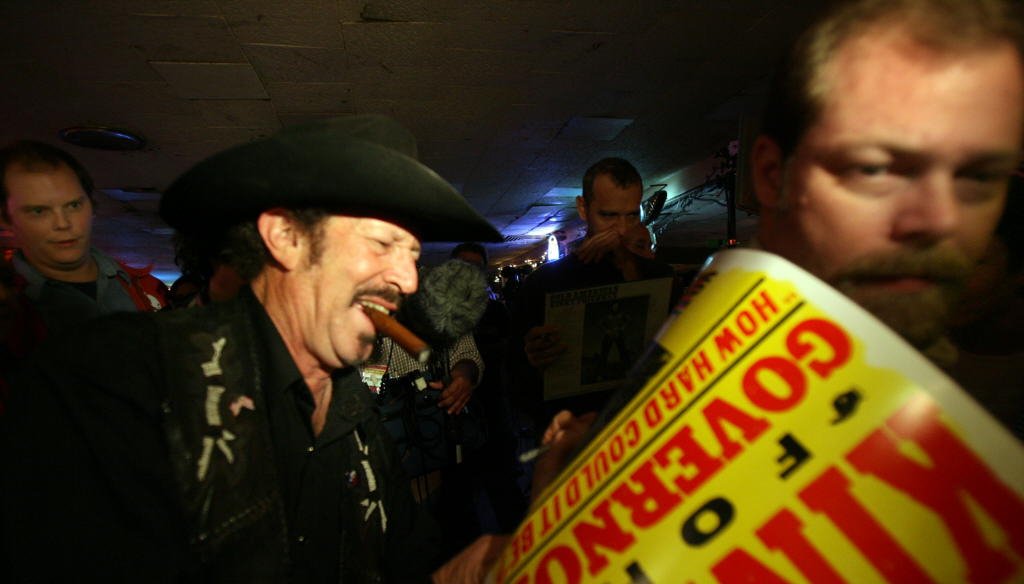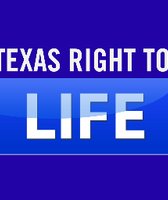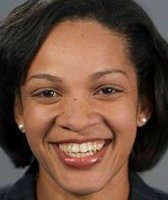Stand up for the facts!
Our only agenda is to publish the truth so you can be an informed participant in democracy.
We need your help.
I would like to contribute

During his 2006 run for governor, singer and humorist Kinky Friedman signs campaign posters at the Broken Spoke dance hall in Austin. (Laura Skelding photo/2006 Austin American-Statesman)
Kinky Friedman says Texas is 1st in business climate, 49th in education
Still got your "Kinky for Governor: How Hard Could It Be?" t-shirt? Humorist, author and singer Kinky Friedman told the Dallas Morning News he’s considering another run.
In an Aug. 1, 2012, commentary, Morning News political writer Wayne Slater quoted Friedman as saying that Gov. Rick "Perry has created a state that’s first in business climate and 49th in education. What’s wrong with that picture?"
Friedman ran for governor as an independent in 2006 and for Texas agriculture commissioner as a Democrat in 2010. This time, he told Slater, he’d go after Perry’s job as a Democrat and with a more serious approach.
By email, we interviewed Friedman spokesman Cleve Hattersley, who worked on the 2006 gubernatorial campaign.
Hattersley said Friedman was referring to a recent "business climate" ranking from CNBC and state education spending rankings from the National Education Association, the nation’s largest teachers’ union. He sent us an NEA report plus a Huffington Post news story and an education professor’s blog analysis with more numbers, and noted, "Kinky has no campaign staff and no fact-checking apparatus, so he was speaking somewhat anecdotally … His numbers may have been a bit off."
The rationale for evaluating Texas education based on spending, Hattersley said, is "that spending affects education on every level, and does so far into the future. Everything from teachers to textbooks is affected."
We set out to check Friedman’s measures and give context with other rankings. We set aside the Perry part of the claim; PolitiFact has found many times that governors don’t merit sole credit or blame for the state of a state.
As to business climate, the picture’s pretty clear. Texas is tops:
- CNBC, July 10, 2012: Texas was No. 1 in the "Top States for Business" rankings. "In our sixth annual study, Texas racked up an impressive 1,604 points out of a possible 2,500, with top-10 finishes in six of our 10 categories of competitiveness." The categories sweep in a wide range of factors, from business regulation and available workforce to cost of living and education.
- Site Selection magazine, November 2011: Texas was No. 1 in state business climate rankings. "By most measures, including Site Selection's own Governor's Cup and Business Climate Rankings, Texas is the place to be for business and industry." To compile its list, the magazine polls business executives and considers factors such as facilities built and business tax climate.
- Chief Executive magazine, May 2, 2012: Texas was No. 1 in the "Best States for Business." "In Chief Executive’s eighth annual survey of CEO opinion of Best and Worst States in which to do business, Texas easily clinched the No. 1 rank, the eighth successive time it has done so."
On education, Hattersley pointed us to five tables in the NEA’s December 2011 report on education spending in 2008-09. The five rankings he cited are based on varied ways to calculate per-student spending from state, local and federal sources combined. Texas averages 41st on those five lists, Hattersley (correctly) noted.
The Oct. 10, 2011, Huffington Post news story Hattersley sent us cited a report from the left-leaning Center on Budget and Policy Priorities (which analyzed data from the National Center for Education Statistics). Looking at state budgets only, the report ranked Texas 3rd in percentage cuts of education spending and 7th in dollars cut. Flipping the rankings to make comparison easier, Texas would have been 47th and 43rd on lists ranking states by the smallest cuts in state funding.
The blog post Hattersley cited is an Oct. 4, 2010, entry on the personal blog of Rutgers University Graduate School of Education professor Bruce Baker. Texas averaged 43rd on the post’s five bar charts analyzing 2007-08 state and local spending per student.
We checked some other measures as well:
- The NEA report Hattersley cited puts Texas at 33rd in per-capita state government spending (rather than per student) on all education.
- Another list in the NEA report places Texas at 40th in per-capita state spending plus local spending for elementary and secondary education.
- Education Week magazine’s 2012 rankings, released in January, placed Texas 40th in its "school finance" category, which wraps in many factors regarding state and local spending.
- A nonpartisan public policy center called the New America Foundation analyzes government data in its Federal Education Budget Project. Based on 2008-09 school year numbers, the project ranked Texas 41st in per-student spending of local, federal and state money.
Because Friedman’s claim referred to "education" rather than specifying "education spending," we looked up a few student performance measures as well.
Texas placed between 12th and 39th on these lists and was near national SAT averages:
- The U.S. Department of Education’s 2011 results from the National Assessment of Educational Progress, as analyzed by the New America project, place Texas 28th in fourth-grade math, 37th in fourth-grade reading, 12th in eighth-grade math and 39th in eighth-grade reading.
- Education Week’s publisher, Editorial Projects in Education, ranked Texas 17th in both 2011 and 2012 on its "K-12 Achievement" index, which it bases on performance, improvement and equity in results between students who qualify economically for free school lunches and those who don’t.
- The College Board discourages ranking states by SAT scores, but 2011 results showed Texas students scored below national arithmetic averages in reading and writing and above the national average in math. Mean scores in Texas (with 58 percent participation, the 13th highest rate) were 475 in reading, 500 math, 461 writing. Nationwide mean scores: 500 reading, 495 math, 497 writing.
We also looked at "adequate yearly progress," a measure that’s been in the news recently as data for the 2011-12 school year emerges. States are required by the federal No Child Left Behind Act to assess such progress, but each state sets its own standards and benchmarks.
An Aug. 8, 2012, Austin American-Statesman news story said the Texas Education Agency reported 44.2 percent of schools met the state’s "adequate yearly progress" standards.
How does that compare with other states? We found 2011 state-by-state percentages calculated by the nonprofit, nonpartisan Center on Education Policy, though deputy director Diane Stark Rentner warned us not to use them for a "ranking," noting again that each state sets its own standards. Recklessly we plunged ahead, using the center’s collection of data for 2011 (when TEA reported 66 percent of Texas schools hit the mark) to generate our own statistically silly list, on which Texas placed 11th. But again: This compares oranges to apples.
Hattersley acknowledged that the backup he provided doesn’t substantiate Friedman’s claim on Texas education. But according to the Morning News interview, we can expect better-researched positions if The Other Man in Black launches a fresh gubernatorial bid.
Would a more serious campaign mean no more "He Ain’t Kinky, He’s My Governor" stickers? "The discussions to which I have been privy are quite serious," Hattersley told us, "but good slogans have always been players in political campaigns."
Our ruling
Friedman nailed the state’s No. 1 business ranking. But his claim that Texas is 49th in education lacks supporting evidence. That said, Texas usually lands in the bottom half of the states, according to education spending and student achievement measures.
We rate Friedman’s claim Half True.
Our Sources
Dallas Morning News commentary, "Kinky Friedman says he may run for governor again," Aug. 1, 2012
Email interviews with Cleve Hattersley, spokesman for Kinky Friedman, Aug. 10-14, 2012
CNBC rankings, "Top States for Business," July 10, 2012
Site Selection magazine rankings, "Top U.S. Business Climates," November 2011
Chief Executive magazine rankings, "Best States for Business," May 2, 2012
National Education Association, "NEA Rankings and Estimates," December 2011
Huffington Post news story, "K-12 Education Funding: Most States At Levels Lower Than Pre-Recession, Cut Spending This Year ," Oct. 10, 2011
Center on Budget and Policy Priorities report, "New school year brings steep cuts in state funding for schools," Oct. 7, 2011
School Finance 101 blog, "State ranking madness: Who spends most/least?," Oct. 4, 2010
Email interview with Bruce Baker, Rutgers University Graduate School of Education, Aug. 16, 2012
Education Week rankings, "Quality Counts 2011" and "Quality Counts 2012"
Federal Education Budget Project of New America Foundation, "Per Pupil Expenditure," accessed online Aug. 17, 2012
Email interview with Hannah Rose Sacks, research analyst at Editorial Projects in Education Research Center, Aug. 16-17, 2012
Email interview with Diane Stark Rentner, deputy director of the Center on Education Policy, Aug. 16-17, 2012
Federal Education Budget Project of New America Foundation, "K-12" analysis, accessed online Aug. 17, 2012
College Board, "2011 SAT Trends"
Austin American-Statesman news story, "48 percent of Texas schools fail federal standards," Aug. 8, 2012
Center on Education Policy report, "AYP Results for 2010-11 — May 2012 Update"
Browse the Truth-O-Meter
More by Sue Owen
Kinky Friedman says Texas is 1st in business climate, 49th in education
Support independent fact-checking.
Become a member!
In a world of wild talk and fake news, help us stand up for the facts.























































